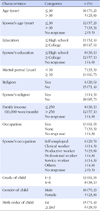Abstract
Purpose
The purpose of this study was to examine the effects of a parenting program applying CBT (Cognitive Behavior Therapy) on parenting behavior, parent satisfaction, and ADHD (Attention Deficit Hyperactivity Disorder) symptoms perceived by mother of children with a tendency to ADHD.
Methods
The study was a one-group pretest-posttest design. The participants were 21 mothers in G city who have children with a tendency to ADHD. The mothers received the parenting program applying CBT for 2 sessions a week over 4 weeks. Data were collected from December, 2011 to January, 2012 and analyzed using paired t-test with the SPSS/WIN 18.0 program.
Results
After attending the parenting program applying CBT, significant differences were found between pre and post test in parenting behavior (t=-2.16, p=.043) and ADHD scores (t=2.38, p=.027).
Conclusion
The results indicate that the parenting program applying CBT is an effective nursing intervention to improve mothers' parenting behavior and decreasing ADHD symptoms perceived by mother of children with a tendency to ADHD. However a quasi-experimental research design with control group is necessary.
References
1. Barkley RA. Defiant children: A clinician's manual for assessment and parent training. 2nd Ed. New York: Guilford;1997.
2. Crase S, Clark S, Pease D. Iowa parent behavior inventory manual. Ames, IA: Iowa State University Research Foundation, Inc;1978.
3. Duke HD, Rose HA, Halverson CF. Predictors of parenting satisfaction. In : Paper presented at 58th NCFR conference; Kansas City, Missouri: 1997.
4. DuPaul GJ, Power TJ, McGoey KE, Ikeda MJ, Anastopoulos AD. Reliability and validity of parent and teacher ratings of attention-deficit/hyperactivity disorder symptoms. J Psychoeduc Assess. 1998; 16:55–68.

5. Hong KO. Relationships between kindergarteners' patterns of attachment and their temperament and their mothers' parenting behavior. Seoul: Korea University;1994. Unpublished doctoral dissertation.
6. Jo SM. The effect of parent education programs for the parents of children with ADHD (attention deficit/hyperactivity disorder). Daegu University: Daegu;2004. Unpublished master's thesis.
7. Johnston C, Ohan JL. The importance of parental attributions in families of children with attention-deficit/hyperactivity and disruptive behavior disorders. Clin Child Fam Psychol Rev. 2005; 8(3):167–182.

8. Kendall J, Leo MC, Perrin N, Hatton D. Modeling ADHD family and child relationships. West J Nurs Res. 2005; 27:500–518.
9. Kim IH. Effect of the parent education program in mothers of child with attention problems. J Korean Acad Psychiatr Ment Health Nurs. 2006; 15:491–499.
10. Kim JW, Park KH, Choi MJ. Screening for attention deficit/hyperactivity disorder in community mental health services for children. J Korean Neuropsychiatr Assoc. 2004; 43:200–208.
11. Kim MY, Seo JY, Park WJ. Relationship of mothers' recognition of attention deficit hyperactivity disorder (ADHD), parenting stress and family support in children diagnosed with ADHD. J Korean Acad Child Health Nurs. 2011; 17:127–135.

12. Korean NeuroPsychiatric Association. Textbook of neuropsychiatry. 2nd ed. Seoul: Joongangmoonwhasa;2005.
13. Lee HD, Lee JK. A study on the development of a educational program for parents with attention-deficit/hyperactivity disorder children. J Stud Guid. 2000; 13:215–237.
14. Lee HR, Ryoo HJ, Kim JH. The effects of active parent education training program on parents child-rearing attitude and communication. Korean J Couns. 2007; 8:533–547.
15. Lee JS, Jung MJ. Children's perception of their mother's child-rearing behaviors in relation to the mothers' childhood experiences, satisfaction as a parent and spousal support in parenting. J Korean Home Econ Assoc. 2007; 45(5):85–94.
16. Lim KA. The relations of emotional expressiveness and spousal support with role satisfaction among men in transition to parenthood. Seoul: Yonsei University;2004. Unpublished master's thesis.
17. McLaughlin DP, Harrison CA. Parenting practice of mothers of children with ADHD: The role of maternal and child factors. Child Adolesc Psychiatry Ment Health. 2006; 11:82–88.

18. Min HK. The effect of parent education program for the problem behavior of ADHD children, mother's child-rearing attitude, parenting stress and mental health. Seoul: Dankook University;2008. Unpublished master's thesis.
19. Park HJ, Heo JY, Kim YH, Song HJ. Development and effects of a combined program of cognitive enhancement-social skills-parents training program for ADHD children and their parents. J Emot Behav Disord. 2011; 27(3):25–58.
20. Park JG, Oh KJ. A comparison of cognitive-behavioral and behavioral parent training: Effects of parent training in the treatment of disruptive behavior problems in children. Korean J Clin Psychol. 2004; 23:829–849.
21. Kim HS, Park KA. A research study on the effects of REBT based group career counseling on college students' career development. Korean J Couns Psychother. 2002; 14:339–358.
22. Park KI, Oh SE. Effects of active parenting today based on goal attainment theory on parenting stress, parenting behavior, and parenting satisfaction in mothers of school-age children. J Korean Acad Nurs. 2012; 42:659–670.

23. Rabiner D. The relationship between ADHD symptoms in parents and their parenting behavior. Attention Research Update, 1. 2004. Retrieved January 24, 2004. from http://www.helpforadd.com/2004/january.htm.
24. Shin HS, Kim JM. Effects of a responsive parenting education program on child's behavioral problems and pivotal developmental behaviors in children at risk for attention deficit hyperactivity disorder. J Korean Acad Child Health Nurs. 2011; 12:39–47.

25. So YK, Noh JS, Kim YS, Ko SG, Koh YJ. The reliability and validity of Korean parent and teacher ADHD rating scale. J Korean Neuropsychiatr Assoc. 2002; 41:283–289.
26. Yang KA, Seo GH, Chae EH, Lee JH, Lee JP. A qualitative research on the psychological adapting process of the mother with ADHD children. J Behav Disabil. 2010; 26(1):85–119.




 PDF
PDF ePub
ePub Citation
Citation Print
Print





 XML Download
XML Download